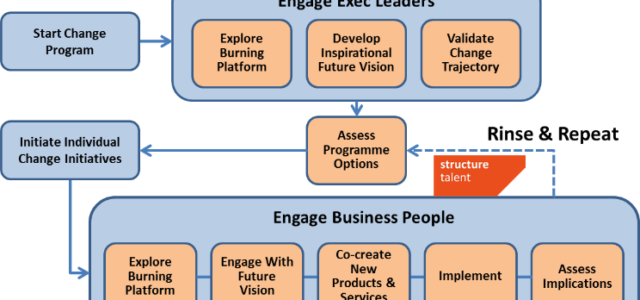The opportunity to take stock of digital transformation, intended as the training of people for change, is double: on the one hand, the recent publication of the research we carried out at Talent Garden entitled “Digital Transformation in the management of human resources” (www.digitaltransformationhr.com) (I insert some interesting data among those that have emerged), on the other the speech I gave in Dublin for the 2018 edition of Future Scope (http://www.futurescope.ie/), one of the most interesting events on the European business innovation scene.
When we talk about digital transformation, the people transformation is central, but the companies – over 600 of those who participated in this first Italian national survey on digital and human resources, created together with Bearing Point and with Talent Soft support – are slow, fearful of change, unable to understand priorities and innovation as a whole. And this is a problem because – although the conviction that transformation is needed is now widespread and that it is a cultural change first (for 35% digital transformation is a new culture of work) – companies are still confused, are affected by the lack of a clear strategy (54%) and above all by the absence of a strong leadership team.
It is therefore urgent to change the approach that points to the technical and cultural preparation to eliminate the still widespread fears, which see the fear of not being able to keep up with the transformation by acquiring the necessary skills (41%) as the greatest obstacle.
The need for a new way of working and a reskilling is strong, it is clear that it is not enough to simply hire new talents and that the entire company must be involved if you really want to change, avoiding confining the digital transformation to a “technological affair”.
Reskilling. How to re-train people in the company
According to the World Economic Forum, as emerged from the paper “Towards a Reskilling Revolution”, encouraging the reskilling of collaborators imposed by the transformation of the professionalism now in progress will be decisive for the economic success of businesses.
From the research we conducted, it appears that the marketing and communication work (62%) and the seller (47%) change, but it is clear to those who understand how innovation is changing everything that the people transformation doesn’t only concern some figures but will touch, one after the other, each job. This is why the term “reskilling” becomes a key point and continuous training must really be put at the centre of the development process: where it is not the companies that do it, the advice is that it is the people who proceed, to avoid the risk of exclusion from a labour market that will be increasingly demanding.
Hiring. The new professionals to research
When it comes to selecting digital roles, it is clear that the new generations have an edge, because at least in appearance they know better the logic that the digital imposes.
Training players – like universities and especially schools like Talent Garden – must work hard to create an effective bridge between study paths and companies.
Analysts and specialists in digital marketing and communication are the leading figures that companies feel they need to include or are already entering. Vertical specialists such as user experience designers and app developers remain important, but it seems not yet perceived as strictly necessary to have an internal digital transformation team. Compared to what emerges from the research, I personally think that the key figure to be inserted is the Data Analyst, and I underline Analyst (some use the term Data Strategist, that’s okay) and not Data Scientist. This is because the real oil is the data, as the Economist explained in the article entitled “The world’s most valuable resource is no longer oil, but data” (https://www.economist.com/news/leaders/ 21721656-data-economy-demands-new-approach-antitrust-rules-worlds-most-valuable-resource), and we urgently need to learn how to use them. That’s why we need those who know how to dialogue with all the figures in the company, not a technician (the Data Scientist), but a generalist with specific skills in terms of data collection, analysis and interpretation.
Soft skills. They are at the core
Team working, leadership and agile management are the soft skills needed in every organization, but great importance is also attributed to critical thinking, the human-centered-approach and emotional intelligence. This is what emerges from the research we did, and I couldn’t agree more: the key point today is not the hard skills – that every 3-4 years require an upskilling or reskilling – but the ability to play a game that changes rules every moment in a world in very strong and continuous transformation.
After all, the World Economic Forum (read the article “The 10 skills you need to thrive in the Fourth Industrial Revolution” confirms that critical thinking is fundamental, as well as creativity, signaled by 27% of the participants in the questionnaire, and the ability to coordinate with others.
All the skills highlighted are typical of digital culture, testifying that at the centre we have to put non-trivial skills but the development of a new way of working that changes the organizations in depth.
Training. It focuses on open innovation
Cultural change and the acquisition of digital skills are two key elements of digital transformation, but also the training methodologies chosen to make this upgrade are important. The era of pure and simple lectures is over, but also e-learning – from what emerges in our research – doesn’t arouse enthusiasm, especially among younger generations (literally no Millennials choose it, leaving it at 0%, while among Baby Boomers and Generation X reaches 33%).
We need to focus on open training models – in line with the growing open innovation approach – that know how to mix different approaches and methodologies with the sole purpose of encouraging a participatory, rapid, continuous and “meritocratic” learning: able to better grow the best.
A mix of inspirational content, direct experience and application workshops is the way to go for training that helps make the difference.
Action. We need to build companies with a digital mindset
The priorities for making companies more digital are the construction of teams with different skills, the introduction of continuous innovation processes and the training of people. This is because companies that will be able to change culturally, triggering a process of continuous training of their collaborators that allow them to keep abreast of digital transformation, will be able to excel in the near future. Said in one sentence: the future is digital, but the people remain at the centre.
Article by channel:
Everything you need to know about Digital Transformation
The best articles, news and events direct to your inbox







